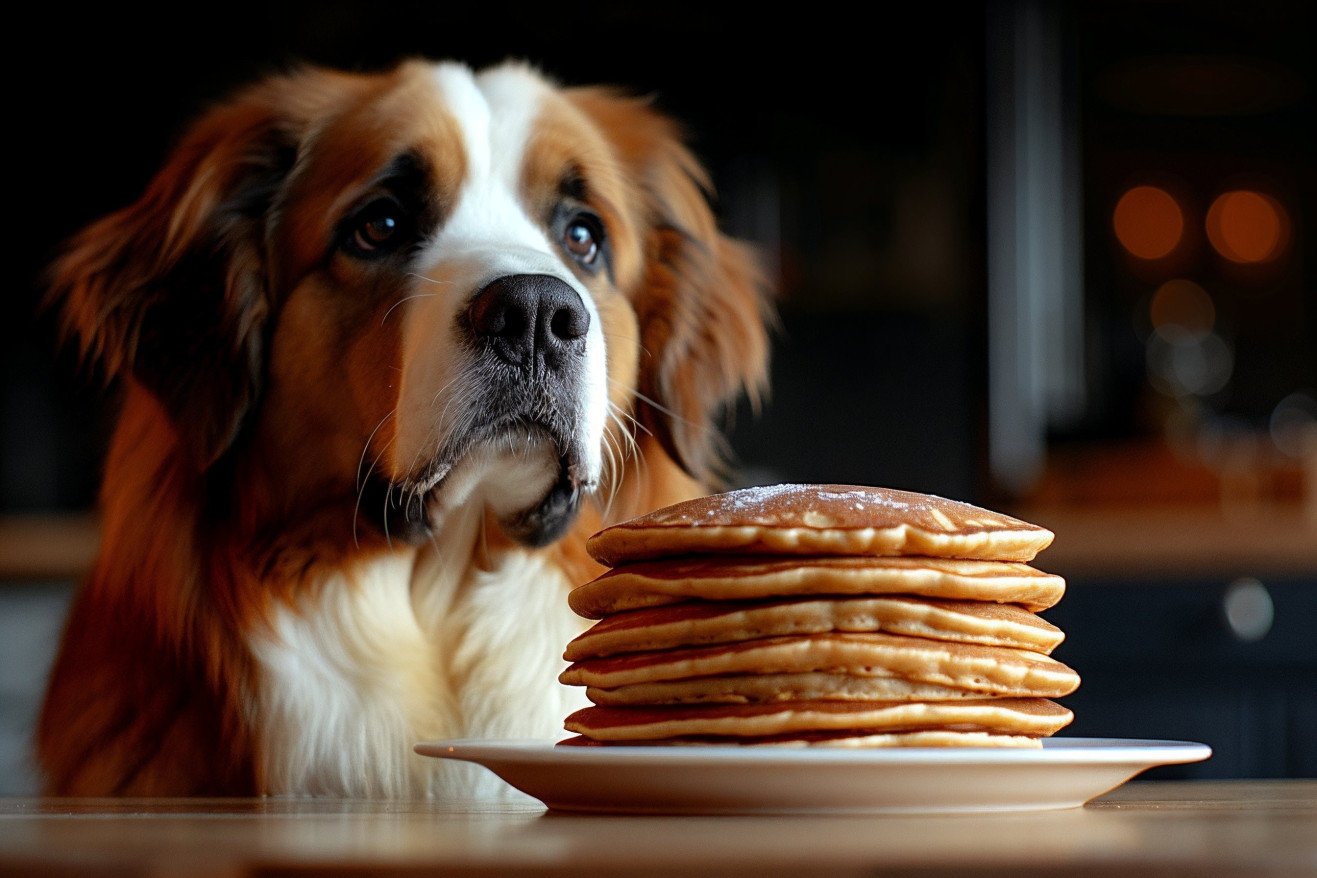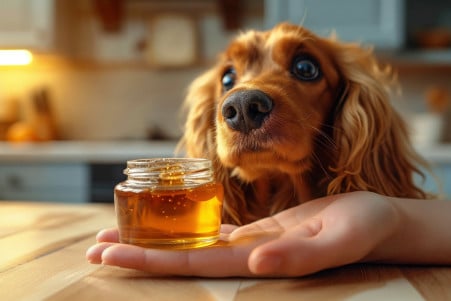Can Dogs Eat Pancakes? A Guide to Safe Canine Snacking
16 February 2024 • Updated 14 February 2024

Pancakes are a classic breakfast food, but can you share this tasty treat with your pup? While dogs can have plain pancakes in moderation, you should steer clear of toppings like syrup and chocolate, which can be toxic.
The artificial sweetener xylitol is also dangerous for dogs. That said, it’s important to make sure the pancakes don’t contain any of these toxic ingredients and to limit them to an occasional small snack to avoid upsetting your dog’s stomach.
To help you better understand this delicious topic, we’ll take a look at information from veterinarians and nutritional experts to discuss the dietary needs of dogs and how certain human foods can impact their well-being.
You’ll find out which pancake ingredients can be good for your dog and which ones you need to watch out for, as well as why it’s important to practice moderation, and how you can tell if a pancake ingredient will lead to happy tail wags or a trip to the vet.
This article is designed to give you the information you need to decide whether or not to share your breakfast with your dog.
Can dogs eat pancakes?
Balancing Indulgence and Nutrition: Pancakes vs. Dog Nutritional Needs
The nutritional profile of a plain pancake includes the macronutrients of carbohydrates from flour, proteins from eggs and milk, and fats, which are a source of energy. However, the nutritional profile of pancakes does not match the balance of essential nutrients that dogs need.
According to VCA Animal Hospitals, a dog’s diet should be made up of six essential nutrients: water, proteins, fats, carbohydrates, minerals, and vitamins. These nutrients are necessary for all the basic processes that take place in a dog’s body, and the AAFCO nutritional standards ensure that commercial dog foods are formulated to include these nutrients.
When the nutritional profile of pancakes is compared to the nutritional needs of dogs, there are some obvious differences. While pancakes can offer proteins and carbohydrates, they do not offer the comprehensive nutritional profile that dogs need, according to PetMD and WebMD.
In particular, they do not include the vitamins and minerals that dogs need to thrive. In addition, feeding dogs pancakes can lead to nutritional imbalances, including an excess of fats and simple carbohydrates, that are not ideal for dogs and can lead to health problems like obesity.
It is important to make sure that dogs get the specific nutrients they need to thrive, so it’s important for dog owners to make sure that pancakes are only an occasional treat and not a regular part of their dog’s diet to avoid these imbalances and excesses that can disrupt a dog’s balanced diet.
Understanding the Risks of Pancakes for Dogs
While pancakes may not seem like a dangerous food, there are a few ingredients that can be harmful to dogs. For example, chocolate is a popular ingredient in pancakes, and it contains theobromine, which is toxic to dogs and can lead to heart problems, seizures, and even death.
Another common pancake ingredient, nutmeg, contains myristicin, which can cause dogs to experience symptoms like disorientation and hypertension.
Dogs can also be lactose intolerant, which means that they can experience stomach upset when they consume dairy-based ingredients in pancakes. According to the American Kennel Club, while a small amount of milk may not be harmful, dogs’ inability to digest lactose can lead to symptoms like diarrhea and vomiting.
In addition, wheat, which is a staple ingredient in pancakes, can cause problems for some dogs. According to the American Kennel Club and Dr. Jerry Klein, while grains are generally safe for dogs, they can cause allergies in some breeds.
Finally, xylitol, an artificial sweetener that is often found in pancake syrups, is especially dangerous for dogs, as it can cause hypoglycemia and liver failure.
Dog owners should always check labels and avoid products that contain xylitol or other harmful ingredients before giving their dogs any human foods.
A Safe Place for Sugar: How to Use Sweeteners in Dog Treats
While a little bit of sugar is unlikely to cause any immediate harm to your dog, PetMD notes that too much sugar can lead to a variety of health problems, including obesity, dental issues, and even diabetes.
The sweeteners that you find in pancakes and their toppings are more worrisome. Xylitol, an artificial sweetener that can be found in everything from sugar-free gum to syrups, is especially dangerous for dogs.
According to the FDA and VCA Hospitals, even small amounts of xylitol can cause dogs to release insulin quickly, leading to hypoglycemia, seizures, and liver failure, all of which can be fatal and require immediate medical attention.
When making pancakes or choosing toppings, it’s important to be extra careful when reading labels. Make sure to avoid any products that contain xylitol or any of its other names, including wood sugar or birch bark extract, which are just as dangerous.
Instead, stick to natural sweeteners that are safe for dogs, like a small spoonful of pure pumpkin puree or a light drizzle of unsalted peanut butter, but make sure that these don’t contain xylitol or any other harmful ingredients.
The best way to ensure that your dog stays healthy and happy is to know exactly what’s in their treats.
Solving the Mystery: Can Dogs Eat Pancakes with Eggs?
According to PetMD, eggs, which are a main ingredient in pancakes, can be a good source of protein and essential fatty acids for dogs. These nutrients can help support a dog’s skin, coat, and overall health.
That said, while eggs can be a healthy part of a dog’s diet, it’s important to consider how they’re being used in pancakes. The CDC explains that the eggs need to be cooked thoroughly because raw or undercooked eggs can lead to salmonella infection, which can cause symptoms such as fever and diarrhea.
It’s important to make sure the eggs are cooked thoroughly when you’re adding them to pancake batter for your dog to avoid this risk. In addition, cooking the eggs deactivates avidin, an enzyme found in raw egg whites that prevents biotin absorption, and reduces the risk of biotin deficiency, which is important for a dog’s skin and coat health and digestion.
If you want to feed your dog eggs, make sure you do so in moderation. Start with a small amount to see if your dog has any allergies or sensitivities, and always talk to your vet about your dog’s specific needs. With these precautions in mind, you can make pancakes with eggs a safe and fun treat for your dog.
Moderation Is Key: Pancakes for Pups
While dogs may love the taste of pancakes, they should be consumed in moderation. PetMD warns that pancakes should be fed to dogs sparingly and in small amounts since they provide no nutritional value to dogs.
When you do give your dog a pancake, make sure to keep an eye on them to see how they react. If your dog seems to be experiencing any discomfort, such as bloating, vomiting, or diarrhea, it may be a sign that they are having trouble digesting the pancakes.
As with any new food, it’s important to introduce pancakes to your dog slowly. Give them a small piece and then monitor them for 24 hours to see if they have any adverse reactions.
It’s also important to make sure that you’re balancing treats with their regular food intake; after all, it’s important to remember that treats should only make up 10% of a dog’s daily caloric intake to avoid the health problems that come with overfeeding.
Keep an eye on your dog’s reaction to pancakes and talk to your vet if you have concerns, especially if your dog has food allergies or other dietary restrictions. By taking these steps and making sure to treat your dog in moderation, you can enjoy giving your dog a pancake treat without worrying about their health.
Pancakes for Pooches: A Final Word
As we’ve made our way through the world of dog-friendly pancakes, we’ve learned about the dos and don’ts that will help keep our furry friends safe. The most important things to remember are to keep it in moderation and to know what’s in the pancake.
While a regular pancake is fine for a dog to eat every once in a while, it’s important to avoid harmful ingredients—chocolate chips, nutmeg, and most importantly, the sweetener xylitol, which PetMD warns can be toxic in even small amounts.
That said, we can’t discount the joy that comes from sharing a treat with our pets. Being a good pet parent means enjoying these moments while still keeping our pets safe. Rover.com suggests reaching out to a vet if you have any questions or if your dog is showing any unusual symptoms after eating a pancake.
So, the answer is yes, dogs can have pancakes, but it should always be done with safety and moderation in mind. As A-Z Animals says, it’s all about offering a bite instead of a pile, so we can keep those tails wagging and bellies happy. Let’s enjoy life’s simple pleasures with our faithful friends in a way that’s both mindful and loving.


